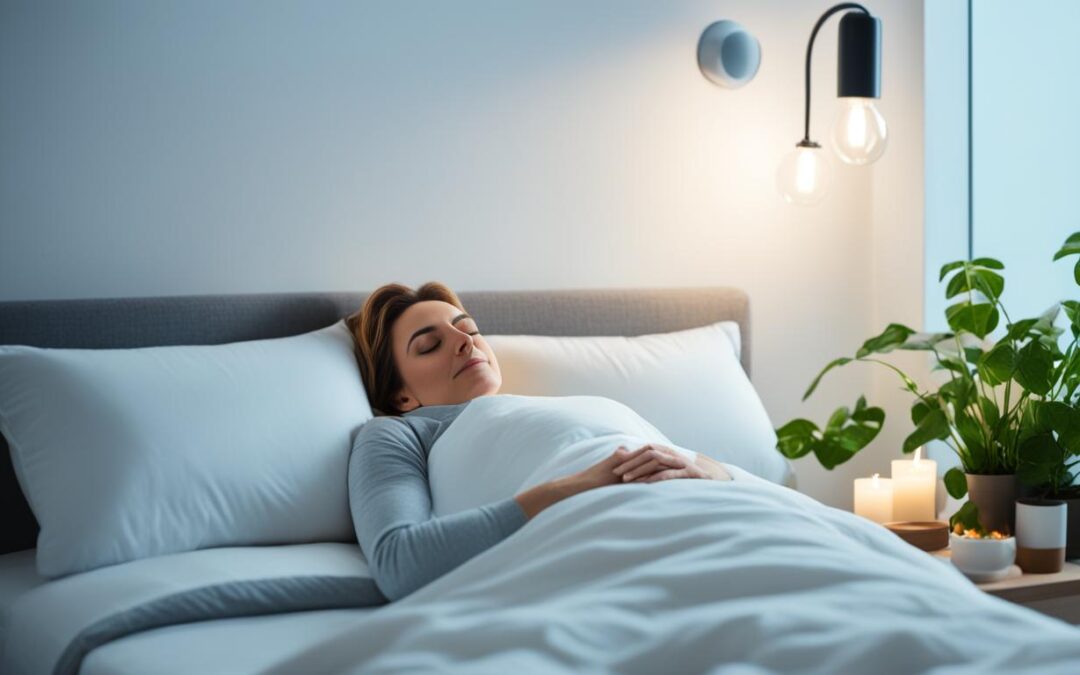Welcome to our article on how sleep hygiene techniques can improve your quality of life. Sleep hygiene encompasses various practices and habits that can optimize both the quantity and quality of your sleep. By following these techniques, you can enhance your overall well-being, physical health, and mental clarity.
Quality sleep is an essential component of a healthy lifestyle and can significantly impact your day-to-day functioning. By incorporating effective sleep hygiene practices, you can improve your sleep quality and, consequently, your quality of life.
In this article, we will explore the importance of sleep hygiene for your overall well-being, provide practical tips for improving sleep quality, and discuss the relationship between sleep quality and quality of life. Whether you are struggling with sleep issues or simply looking to optimize your sleep routine, this article aims to provide you with valuable insights and actionable strategies.
So, let’s delve into the world of sleep hygiene techniques and discover how they can positively impact your quality of life. Read on to learn more!
Understanding Sleep Hygiene Practices
Sleep hygiene encompasses various practices that can significantly improve the quality of your sleep and overall health. By establishing a consistent sleep schedule, prioritizing sleep, and incorporating healthy habits into your daily routine, you can optimize your sleep environment and enhance the quality of your rest.
One of the key aspects of sleep hygiene is maintaining a regular sleep schedule. Going to bed and waking up at the same time every day helps regulate your body’s internal clock, promoting better sleep quality. Gradually adjusting your sleep times, if necessary, can also help align your sleep schedule with your natural circadian rhythm.
Building a consistent bedtime routine can also contribute to better sleep hygiene. Engaging in relaxing activities before bed, such as reading a book or taking a warm bath, signals to your body that it’s time to wind down and prepare for rest. Dimming the lights and reducing exposure to electronic devices can further facilitate the transition into a restful state.
Additionally, incorporating healthy habits into your daytime routine can support a healthy sleep-wake cycle. Exposing yourself to natural light during the day helps regulate your circadian rhythm and promotes better sleep at night. Regular exercise, when done earlier in the day, can also positively impact sleep quality.
Your bedroom environment plays a crucial role in sleep hygiene as well. Creating a calm and comfortable sleep environment can enhance your ability to fall asleep and stay asleep throughout the night. Investing in a comfortable mattress and pillow, ensuring proper bedding, controlling the temperature, and minimizing light and noise disruptions can all contribute to creating an optimal sleeping environment.
By practicing these sleep hygiene techniques, you can improve your sleep quality, leading to better overall health and well-being. Now let’s explore the importance of sleep hygiene for your quality of life.
The Importance of Sleep Hygiene for Quality of Life
Consistently practicing good sleep hygiene can have a significant impact on your overall quality of life. Prioritizing sleep hygiene is essential for maintaining your physical and mental health, improving productivity, and enhancing your overall well-being.
Physical Health Benefits
Practicing good sleep hygiene contributes to your physical health in several ways. It helps boost your immune system, allowing your body to fight off illnesses and infections more effectively. Additionally, quality sleep enhances brain function, improving your cognitive abilities and memory. By prioritizing sleep hygiene, you can reduce the risk of chronic conditions like obesity, diabetes, and cardiovascular disease.
Mental Health Benefits
Sleep hygiene plays a crucial role in your mental well-being. It promotes emotional stability, reducing stress, anxiety, and depression. Quality sleep enhances your cognitive function, enabling you to think clearly, make better decisions, and concentrate on daily tasks. By practicing good sleep hygiene, you can improve your mental health and experience a greater sense of well-being.
Productivity and Quality of Life
Quality sleep is closely linked to increased productivity and overall quality of life. When you prioritize sleep hygiene, you provide your body and mind with the rest they need to perform optimally. With improved sleep, you can expect enhanced energy levels, better mood, and increased motivation to tackle daily challenges. Quality sleep also improves your ability to focus, concentrate, and remember information, leading to greater productivity and success in various aspects of life.
Sleep Hygiene Tips for Better Quality of Life
Implementing the following sleep hygiene practices can help you improve your sleep quality and enhance your overall quality of life:
| Tip | Description |
|---|---|
| 1. Stick to a Sleep Schedule | Establish a consistent sleep schedule by going to bed and waking up at the same time every day, even on weekends. |
| 2. Create a Relaxing Bedtime Routine | Develop a routine that includes relaxation techniques, such as reading a book, taking a warm bath, or practicing meditation, to signal to your body that it’s time to sleep. |
| 3. Optimize Your Sleep Environment | Create a comfortable and conducive sleep environment by keeping your bedroom dark, quiet, and at a cool temperature. Use a comfortable mattress and pillow to ensure proper support. |
| 4. Limit Exposure to Electronic Devices | Avoid using electronic devices, such as smartphones and tablets, before bedtime as the blue light emitted can disrupt your sleep-wake cycle. |
| 5. Limit Caffeine and Alcohol Intake | Avoid consuming caffeine or alcohol close to bedtime, as these substances can interfere with your sleep patterns and quality. |
| 6. Exercise Regularly | Incorporate regular exercise into your daily routine, but avoid exercising too close to bedtime, as it can make it harder for you to fall asleep. |
| 7. Manage Stress | Practice stress management techniques, such as deep breathing exercises, meditation, or journaling, to help calm your mind before sleep. |
The Relationship Between Sleep Quality and Quality of Life
Research studies have consistently shown a strong correlation between sleep quality and various aspects of quality of life. When it comes to achieving a high quality of life, sleep plays a critical role in promoting overall well-being and happiness.
People who consistently experience high-quality sleep often report increased life satisfaction and improved subjective health. Quality sleep contributes to an improved mood, better decision-making skills, enhanced emotional processing, and improved coordination.
On the other hand, poor sleep quality can have detrimental effects on one’s overall quality of life. Research has indicated that individuals who struggle with poor sleep quality are more likely to experience decreased mood, impaired cognitive function, and a higher risk of chronic health conditions.

Tips for Improving Sleep Quality
To improve your sleep quality, it’s important to incorporate certain practices into your daily routine. By following these tips, you can enhance the quality of your sleep, leading to better physical and mental well-being.
Establish a Consistent Sleep Schedule
One of the key factors in improving sleep quality is maintaining a consistent sleep schedule. Try to wake up and go to bed at approximately the same time every day. This regularity helps regulate your body’s internal clock, promoting a more restful sleep.
Get Natural Light Exposure
Natural light exposure, especially in the morning, is crucial for regulating your circadian rhythm. Try to spend time outdoors or open your curtains to let in natural light. This exposure helps align your sleep-wake cycle, making it easier to fall asleep at night.
Practice Good Sleep Hygiene
Implementing good sleep hygiene habits can greatly improve your sleep quality. Limit your consumption of caffeine and alcohol, especially in the evening. These substances can disrupt your sleep patterns and make it harder to fall asleep and stay asleep. Avoid using electronic devices before bedtime, as the blue light emitted by screens can suppress the production of melatonin, a hormone that regulates sleep. Instead, wind down with relaxing activities like reading a book or taking a warm bath. Consider incorporating relaxation techniques such as breathing exercises or meditation to help calm your mind and prepare your body for sleep.
Consult with a Healthcare Provider
If you continue to struggle with persistent sleep issues, it may be beneficial to consult with a healthcare or mental healthcare provider. They can provide personalized guidance and recommend appropriate interventions to address your specific sleep concerns.
| Sleep Quality Tips | Description |
|---|---|
| Establish a Consistent Sleep Schedule | Wake up and go to bed at the same time every day to regulate your body’s internal clock. |
| Get Natural Light Exposure | Spend time outdoors or open curtains to let in natural light, helping to align your sleep-wake cycle. |
| Practice Good Sleep Hygiene | Limit caffeine and alcohol intake, avoid screens before bed, and use relaxation techniques to prepare for sleep. |
| Consult with a Healthcare Provider | If sleep issues persist, seek professional guidance to address your specific concerns. |
Conclusion
Prioritizing sleep hygiene is crucial for improving your quality of life. Quality sleep plays a vital role in both your physical and mental well-being, as well as your overall productivity. By incorporating sleep hygiene practices into your daily routine, you can enhance the quality of your sleep and enjoy the many benefits it brings.
One of the key aspects of sleep hygiene is maintaining a consistent sleep schedule. Going to bed and waking up at the same time every day helps regulate your body’s internal clock and promotes better sleep. Additionally, creating a relaxing bedtime routine can signal to your body that it’s time to wind down and prepare for sleep. This can include activities like reading a book, taking a warm bath, or practicing relaxation exercises.
Optimizing your sleep environment is another important factor in improving sleep quality. Ensure that your bedroom is dark, quiet, and at a comfortable temperature. Investing in a quality mattress, pillows, and bedding can also make a significant difference. Minimizing electronic devices and limiting screen time before bed can help reduce sleep disruptions caused by blue light exposure.
If you’re experiencing persistent sleep issues, it’s essential to seek professional help. A healthcare or mental healthcare provider can provide guidance tailored to your specific needs and preferences. Remember, everyone’s sleep needs are different, so it’s important to find what works best for you in terms of sleep hygiene practices and make adjustments accordingly.

